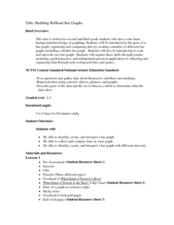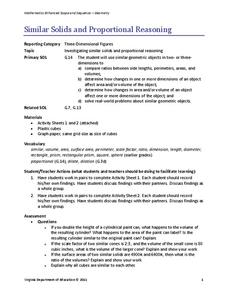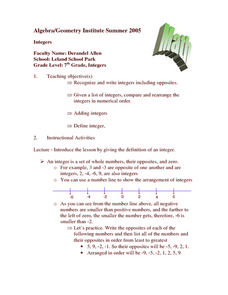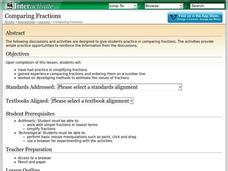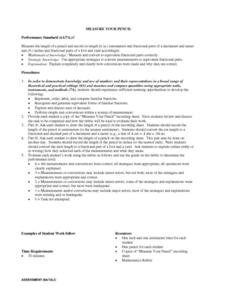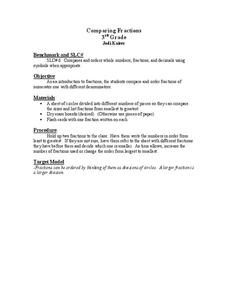Concord Consortium
Acid Test
This isn't your typical basic lesson—it's more acidic! Learners use pH information to determine the hydroxide ion concentration of different substances and then use these values to analyze information. The calculations require...
Education Development Center
Adding Fractions with Unlike Denominators
If the fractions don't have a common denominator, make them have one. Learners first read and analyze a conversation of pupils trying to add 2/5 and 1/2. They compare the process of adding fractions to the process of adding quantities...
Curated OER
Building Brilliant Bar Graphs
Everything you need for a mini-unit on bar graphs is included in this lesson plan! It outlines three lessons and includes worksheets. Learners taste pretzels, shoot baskets (switching off hands), and grab candy, graphing results...
Baylor College
There's Something in the Air
Clever! In order to compare indoor and outdoor dispersal rates for the movement of gases and particles through air, collaborators will participate in a classroom experiment. Set up a circular grid and set students on lines that are...
Institute of Electrical and Electronics Engineers
Exploring at the Nanoscale
Nano-nano! Nanotechnology can seem like it's from another planet! After learning about this tiny technology, collaborative groups experiment with how smaller particles affect chemical reactions. They do this by immersing a whole and a...
Illinois State Board of Education
Solar System
Aspiring astronomers solve problems involving mixed units of the same attribute, including time, money, length, and area. They convert large numbers into scientific notation, then compute and compare ratios to explain why drawing...
Virginia Department of Education
Similar Solids and Proportional Reasoning
Double the dimensions, quadruple the surface area. Pairs build similar prisms and compare the ratios of their surface areas and volumes to the ratio of the heights. Given two similar cones, partners determine the ratios of the lateral...
Curated OER
Pumpkin Problems
Students participate in a instructional activity that has the intention of working on estimation skills. They use pumpkins to estimate the number of seeds are inside. They collect data for each pumpkin and compare it to the estimation....
Curated OER
Compare and Arrange Whole Numbers Up to 100
Number whizzes investigate integers by arranging them in a specific order. They utilize whole numbers which are given to them and then put them in order up to 100. They also practice using "greater than" or "lesser than" symbols.
Curated OER
Integer
Seventh graders examine the characteristics of an integer. As a class, they observe a number line and recognize opposite numbers. Algebra tiles, or counters, are used to explore the concept of adding integers. In groups, 7th graders play...
Curated OER
Review of Addition Facts
In this addition worksheet, 1st graders write down the addends that make up 5 and 6. They match addition problems to the sums 5 and 6, and find the missing addends in 10 problems. They compare equations to 5 and 6 using the symbols for...
Curated OER
Comparing Ratios
For this comparing ratios worksheet, students solve and complete 3 different problems using the screens shown. First, they write a ratio that compares the shaded part to unshaded part illustrated. Then, students use the same grid to...
Curated OER
Comparing Whole Numbers to 5
In this comparing whole numbers learning exercise, students insert the greater than less than or equal to sign to compare pairs of numbers to 5. An answer key is included and examples are completed for students.
Curated OER
Comparing Fractions
Students discuss the nature of fractions and compare fractions based on a similar whole to determine relative size.
Curated OER
Teaching Arithmetic and Math Concepts to Headstarters
Students discover early number concepts for numbers 1 through 5. For this number concepts lesson, students work in stations doing hands-on activities such as sorting colored blocks, stringing beads, and counting sticks. Students also...
Curated OER
Measure Your Pencil
Fifth graders use concepts of measurement to record the dimensions of a pencil. The unit of a pencil is used to compare it as part of a larger measurement like a yard. Students convert equivalent fractions accurately. Students also...
Curated OER
Customary Units of Weight - Practice 12.4
Upper graders find missing numbers, determine the best unit to weight certain items, compare and solve two test prep questions. Houghton Mifflin text is referenced.
Curated OER
Integers
In this integers worksheet, students evaluate numbers and equations and fill in the correct comparing symbols. Students complete 16 questions total.
Curated OER
Comparing Fractions
Third graders observe two fractions and write the numbers in order from least to greatest referring to the sheet with different fractions they have before them to help them decide which one is smaller. Time allowing, they practice...
Curated OER
Comparing and Ordering Whole Numbers and Decimals
In this numbers with decimals instructional activity, students answer multiple choice questions where they compare and order whole numbers with decimals. Students answer 10 questions total.
Pennsylvania Department of Education
Comparing Sets
Students count back with cubes to model subtraction problems. For this subtraction lesson plan, students compare sets of problems and record their results in a table.
Curated OER
Comparing Fractions
Students use the assistance of computers to explore reducing fractions. Using various internet activities, students experience comparing and ordering fractions. They develop methods to estimate the value of fractions.
Curated OER
Customary Units of Capacity - Practice 12.3
In this units of capacity learning exercise, students find missing numbers in comparisons, choose units to measure capacity of items and compare. Houghton Mifflin text is referenced.
Curated OER
Who Needs Numbers?
Students identify whole numbers through the one millions place. In this place value lesson, students read the book The Day Without Math and use place value mats to create numbers to the millions place. Students use base ten blocks during...




